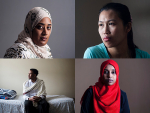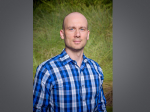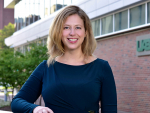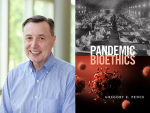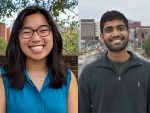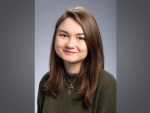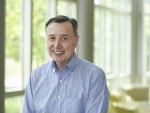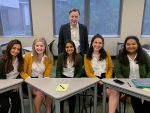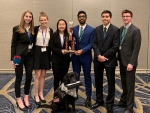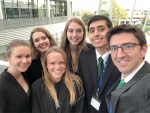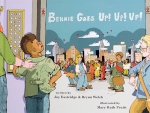Displaying items by tag: department of philosophy
The Goldwater Program received 1,353 nominations from 446 institutions this year, and the winners will receive a scholarship covering tuition, housing, fees and books.
Tagged under
- release
- college of arts and sciences
- neuroscience
- school of medicine
- department of neurology
- department of cell developmental and integrative biology
- department of philosophy
- graduate school
- honors college
- office of the provost for student and faculty success
- national and international fellowships and scholarships
Academics and dance have a lot in common: Kendall Baker brought her interests and passions together to earn two degrees while performing with the Alabama Ballet.
Tagged under
“Refugees, Empathy, and Human Rights” is a nationwide traveling exhibition featuring contemporary portraits and poetic stories illustrating the challenges of refugees building new lives in the United States.
Tagged under
- release
- college of arts and sciences
- department of philosophy
- department of history
- institute for human rights
- alys stephens center
- school of public health
- sparkman center for global health
- department of world languages and literatures
- department of political science and public administration
- department of social work
Kevin McCain’s award-winning book “Understanding How Science Explains the World” explores the nature of scientific explanation and addresses common misconceptions about scientific theories.
Tagged under
Key to moral insight is taking a proactive approach to understanding different perspectives, such as befriending opponents and practicing mindfulness.
Tagged under
Nearly 2,000 graduating students will walk in three commencement exercises in UAB’s Bartow Arena, which will be streamed online.
Tagged under
- release
- office of the provost for student and faculty success
- commencement 2023
- graduate school
- college of arts and sciences
- honors college
- school of education
- school of engineering
- school of medicine
- school of optometry
- school of public health
- school of health professions
- school of nursing
- collat school of business
- department of philosophy
The first annual Alabama High School Ethics Bowl connected 30 local students with the opportunity to have debates on moral issues.
Tagged under
A new study focuses on hypertension, diabetes and dyslipidemia — a high level of lipids that can lead to heart attack, stroke or other heart issues — and social determinants associated with HIV.
Tagged under
In his latest book, “Pandemic Bioethics,” philosophy professor Greg Pence, Ph.D., examines allocation of scarce medical resources, immunity passports, vaccines, discrimination and more. It is available as an e-book now and will be in print June 18.
Tagged under
Tagged under
Join UAB and Jemison Visiting Professor Amia Srinivasan, Ph.D., University of Oxford, to discuss the #MeToo movement.
Tagged under
Rose Albert and Karthik Reddy, both members of UAB’s Honors College and studying in the College of Arts and Sciences, were selected for the competitive award in math and science.
Tagged under
Professor, author and podcaster Myisha Cherry, Ph.D., will discuss why some conversations are hard to have and what you can do about it, part of UAB’s Jemison Visiting Professorship on March 31.
Tagged under
Honors student Parker Rose is UAB’s first recipient of the Beinecke Scholarship to pursue graduate education, established in 1975.
Tagged under
This summer, approximately 1,708 students will graduate from UAB, and nearly 1,000 are expected to participate in the ceremonies.
Tagged under
- release
- college of arts and sciences
- department of political science and public administration
- department of anthropology
- department of philosophy
- school of nursing
- graduate school
- school of education
- collat school of business
- school of engineering
- school of medicine
- school of public health
- school of health professions
- commencement
A UAB Department of Philosophy professor was recognized for academic achievement and involvement in the community.
Tagged under
UAB students led their team to victory, bringing home the National Championship title for the third time in eight years.
Tagged under
UAB students advance to next level of debates after four-round winning streak at the Southeast Regionals in Jacksonville, Florida.
Philosophy’s Brynn Welch turned a real-life experience into practical change — first through scholarly research, then a children’s book and now the classroom.
Tagged under


